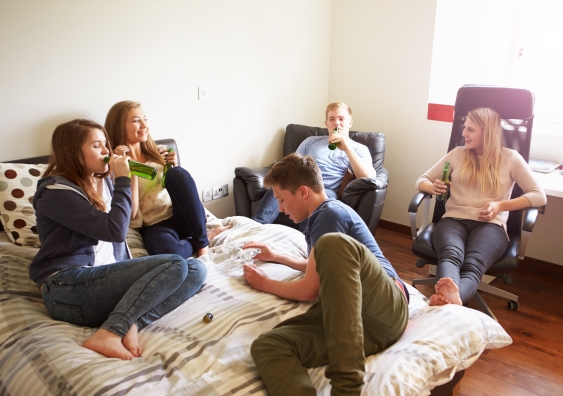Should parents give their children alcohol?
Teenagers and alcohol – how soon is too soon? It’s one of the thorniest dilemmas confronting parents.
Teenagers and alcohol – how soon is too soon? It’s one of the thorniest dilemmas confronting parents.

Children and teens who are given alcohol by their parents are twice as likely to be drinking full serves of alcohol by age 15 or 16, but are much less likely to binge drink, a UNSW study shows.
The four-year study of nearly 2,000 children and their parents found parental supply of alcohol doubled the likelihood the teens would be drinking full serves of alcohol a year later. Getting alcohol from other sources, such as peers or other adults, also doubled the chance of the adolescents going on to drink full serves.
But those children who got alcohol from sources other than their parents were three times more likely to binge drink. As well as being less likely to binge, the adolescents given alcohol by their parents also typically drank less on any drinking occasion than those supplied by their peers or others.
The study was prompted by widespread interest in what is known as the “European model” of introducing children to alcohol – where children are offered sips of alcohol by their parents from a young age.
UNSW Professor Richard Mattick, a lead author of the study published in the British journal Psychological Medicine, says some people believe the European model is protective of later harmful drinking. “There is a body of research indicating the adolescent brain is still developing well into the early 20s and alcohol may interfere with optimum development,” says Mattick, a Principal NHMRC Research Fellow at the National Drug and Alcohol Research Centre.
“But also we know parents want to do the right thing by their children and there has been anecdotal evidence that children introduced to alcohol by their parents, as is common in some European cultures, may be less likely to develop problems with alcohol.”
Mattick and colleagues from universities in Perth and Tasmania recruited 1,927 adolescents from schools in Sydney, Perth and Tasmania and followed them for four years from Year 7.
“There is research indicating the adolescent brain is still developing into the early 20s.”
The team measured the teenagers’ consumption of whole drinks, their binge drinking (more than four drinks on any occasion) and the source of alcohol supply – parent, peers or other adults. One parent of each child was also surveyed annually as part of the study, with the questionnaires being sent separately to avoid bias.
A number of other factors that earlier studies have found are associated with adolescent drinking (such as family alcohol use, family structure and conflict, and individual personality traits) were taken into account.
Mattick says the results painted a nuanced and complex picture for parents. “On the one hand parents who supply alcohol to their children may be relieved that they are significantly less likely to engage in harmful behaviour, such as binge drinking, compared with those who obtain alcohol from other sources, probably as they are drinking more in front of their parents, so drink less on a given occasion,” he says.
“However, given that children supplied alcohol by their parents were twice as likely to be drinking full serves a year later as their peers who were not given alcohol by their parents, the results suggest that parents who supply alcohol, even with the best intentions, are likely to accelerate their child’s drinking and be laying down the potential for future harms.
“There may be later harms that are not yet obvious, and we are aware that early initiation of drinking is strongly associated with later alcohol use problems in adulthood – delay is the best strategy.”